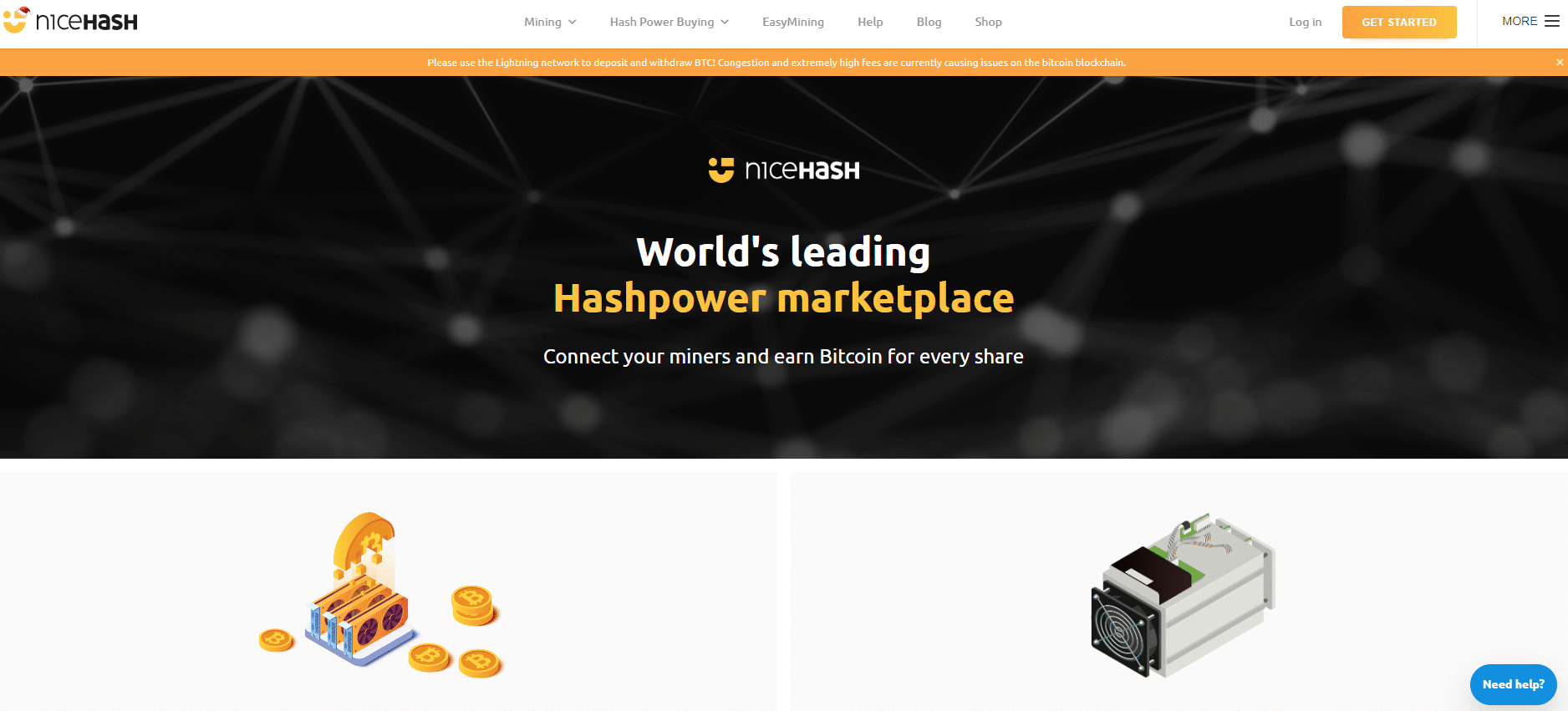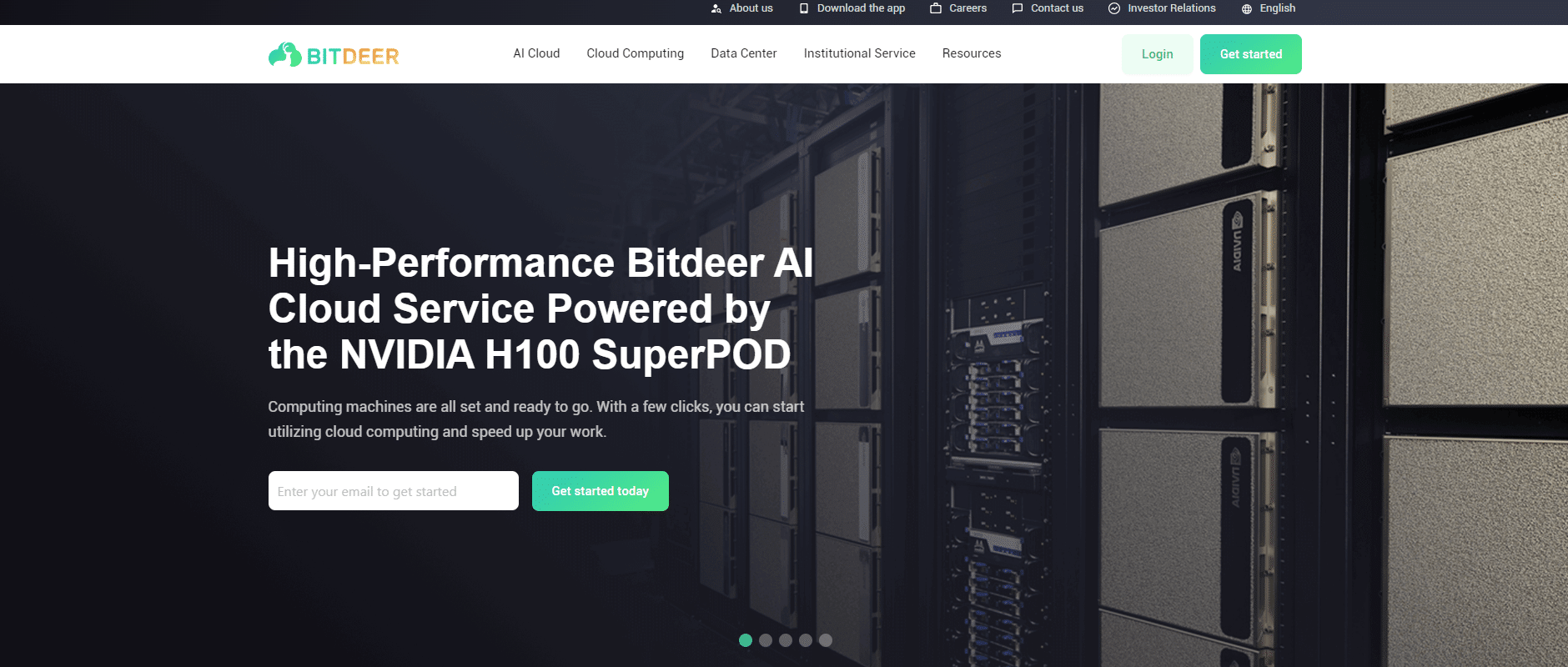What is Cloud Mining in Crypto? – Trading Guide 2025

Since the evolution of cryptocurrency, several opportunities have presented themselves to investors in various ways. One of many is cloud mining, which has become a profitable venture. It allows investors to leverage blockchain technology to generate income seamlessly – different from traditional mining.
Cloud mining differs from regular mining in several ways, but one of them is the operation mechanism. The former requires an affordable subscription to a cloud-based service provider, while the latter involves utilizing heavy-duty and expensive hardware. In short, crypto cloud mining is convenient.
As this guide explores “What is cloud mining in crypto?” you should gain valuable insight into the advantages and disadvantages. We would also provide helpful information about various cloud-based services, allowing you to decide if it is worth the investment.
-
-
Understanding Mining in Cryptocurrency
Many articles may have tried to describe “What is cloud mining in crypto?”; however, it may be difficult to provide a well-detailed explanation without considering some factors. One such is understanding what mining means in cryptocurrency and why it is the next best thing for every investor.
Mining in cryptocurrency is the process of maintaining the security of a blockchain network. It involves verifying and recording new blocks of transactions in exchange for collecting cryptocurrencies. It requires a carbon footprint (electricity), maintenance, and, more importantly, hardware.
An example of such hardware is the Application-Specific Integrated Circuit (ASIC), which validates transactions on decentralized computers. With this hardware, miners verify BTC or crypto transactions and get rewarded as coins. The incentive, however, depends on the blockchain technology.

Cryptocurrency Mining was a straightforward process that involved using a computer. Unfortunately, technological advancement (i.e., the expensive mining hardware, carbon footprint, and some technicalities) and the high market competition brought about a paradigm shift, making it complicated.
Eventually, the average crypto enthusiast found it impossible to mine seamlessly. Thus, due to the increasing number of challenges faced, cloud mining emerged as an alternative. It bridged the gap between individuals and technical requirements/complex mining infrastructure.
Role of Mining in Blockchain Networks
Generally, Blockchain Mining is described as the computational effort undertaken by network nodes to verify information in blocks of transactions. That keeps the role of mining simple – to maintain the integrity, transparency, and security of the decentralized blockchain network against fraud.
Over ten thousand transactions are performed on the blockchain network daily, and there is a need to provide a mechanism for validating them. Mining presents itself in such a nature. It allows any miner with significant computer power to verify these transactions and maintain the network’s integrity.
Another role of mining is to ensure new coins are circulated. Every miner gets an incentive for their contribution to the network. This reward is in the form of coins, which often end up back into circulation. Ultimately, it keeps such a cryptocurrency available on the market.
Additionally, mining in blockchain networks helps prevent double-spending on crypto trading apps. It fosters discipline and trust among crypto users.
Mining’s Importance for Transaction Validation
Mining involves using high-end hardware and software to solve complex mathematical problems. The process depends on a Proof of Work (PoW) consensus mechanism, which only allows cryptocurrencies on PoW-based networks, such as Dogecoin, Monero, Ethereum, BitcoinCash, Litecoin, etc.
One important aspect of crypto mining is transaction validation. It is necessary to ensure consensus and validate the network’s stability. It protects against double-spending, fraud, and other breaches in security. Thus, with these menaces curbed, the efficient running of transactions is guaranteed.
Your capital is at risk.
What is Cloud Mining?
Let’s get into it. What is cloud mining in cryptocurrency? We would discuss further using Bitcoin as an example of a cloud-mined crypto.
Definition and Overview
Cloud Mining, also called Cloud-based Cryptocurrency Mining, generates new cryptocurrencies by validating transactions utilizing a shared or leased mining power. Its operation mechanism removes the need for hardware and utilizes computing power from a third party.
Cloud mining doesn’t require individuals to own expensive mining rigs, have some technical know-how, or pay high electricity bills. It allows miners to assess hash power from a remote data center (mining farm) operated by a service provider and earn incentives on every transaction.
What is BTC cloud mining?
By definition, Bitcoin cloud mining involves buying or subscribing to hash power from a mining farm to rent equipment for new blocks of BTC transactions. And as a miner gets incentives, the third-party service provider receives a commission on each Bitcoin transaction.
Concept of Remote Mining Operations
Cloud Mining is an example of Remote Mining Operations. It is far different from traditional mining and entails mining activities in locations distant from the data center. This concept, rooted in cloud computing, leverages a remote server network, relieving miners of direct hardware management.
So, while regular mining happens with a hardware and a computer, cloud mining offers different packages to purchase a share of a provider’s infrastructure. And that being said, the main types of cloud mining are:
-
Hosted Mining
This cloud mining is the most popular. It involves renting or purchasing mining equipment and entrusting its maintenance to a service provider. It remains in the provider’s facility while customers control operations well. Hosted mining allows the tracking of the mining rig’s performance remotely.
-
Virtual Hosted Mining
Another cloud mining type is Virtual Hosted Mining, which involves creating or renting a virtual private server and installing personal mining software to perform operations. This method offers good computational power flexibility. It also removes the need to buy physical mining hardware into a facility.
-
Leased Hashing Power
Customers lease a specific amount of hashing power from a cloud-mining third-party provider in this Leased Hashing Power. It works as a subscription-based system. Unfortunately, this method doesn’t guarantee control over the mining hardware. However, miners get a percentage out of the pool’s profit.
Pros and Cons of Cloud Mining
As we go further in explaining “What is cloud mining Bitcoin or other cryptocurrencies?” it is significant to mention the pros and cons. Understanding these merits and demerits will help individuals decide whether cloud mining is profitable.
Pros:
- Provides accessibility to the world of crypto mining
- Saves cost
- Convenient and flexible
- Not limited by technical know-how
Cons:
- Limited control
- Uncertain profitability
- Risk of fraud and scams
- Minimal mining rewards
- Dependency on the service provider
Cloud Mining Regular Mining No hardware ownership Miners operate mining hardware Mining hardware is located in remote data centers Mining hardware is set up at a preferred location Cloud mining provider handles maintenance and optimization Miners are responsible for maintaining and optimizing hardware Requires paying hash power leasing fees Requires covering regular costs of mining hardware, electricity, and maintenance Table 1: Differences between cloud mining and regular (traditional) mining
Exploring Cloud Mining Services
Apart from “What is cloud mining in cryptocurrency?” another noteworthy piece of information, we would provide a review of the top cloud mining service providers. Many exist, but we have offered potential miners trustworthy options based on their services and costs.
So, here are the selection factors considered;
- Third-party reviews
- Transparency rating
- Integrity
- Customer support feature
Different Cloud Mining Platforms
Here are five of the top cloud mining service providers.
-
NiceHash
NiceHash is the world’s leading hashpower marketplace where people can connect to miners and earn rewards. This company was founded in 2014 with the sole aim of promoting a simple and open marketplace. During this period, NiceHash has built over 500,000 communities and served 190 countries.
It boasts of over a million miners and has established good partnerships with them to aid a seamless mining process. It is known to adopt cryptocurrencies like Bitcoin, Dogecoin, Litecoin, Ethereum, and over 5 million others.
-
ECOS
ECOS is one of the most trusted cloud mining service providers for cryptocurrencies. This company was founded in 2017 and has gained a huge reputation for its beginner-friendly platform. It offers several packages, including an Easy Earn Plan for beginners to earn up to 14% passive income.
ECOS prides itself in its state-of-the-art mining farm that supports 60Mbt. The investment ecosystem in the Free Economic Zone also claims to have over 5,000 clients and mined over 7,000 Bitcoins.
-
Bitdeer
Bitdeer is an industry-leading high-cloud computing platform and management company that allows users to manage computing performance and infrastructure. It is a trusted Bitcoin mining platform utilizing an NVIDIA H100 SuperPOD-powered AI cloud service for seamless mining.
Bitdeer boasts superior networking consisting of 64 non-blocking 400Gb/s ports with an overall throughput of up to 51.2Tb/s. It also has exquisite GPU computing with 900GB/s bandwidth. Its HPC storage to ensure a good experience includes a sequential read and write up to 90GB/s and 65GB/s.
-
BeMine
BeMine is a service provider that provides a simplified approach to mining. It links users to suitable machines that will help them gain maximum profits. It uses an advanced cloud hosting system. This company was founded in early 2018 while building its foundation on core values like transparency and security.
BeMine’s system allows equipment owners to perform crypto mining online by uniting them with data centers. The company also allows miners to buy up to 1/100 of a share of a certain ASIC at a good price, which would be useful in mining coins without a rig. This facilitates an easy experience overall.
-
StormGain
StormGain is described as an all-in-one cryptocurrency platform and mobile app where Bitcoin and cloud mining occur.
It was established in 2019 as one of the safest places to buy Bitcoin and mine and a few other coins like Litecoin, Ethereum, and Dogecoin.
Top Service Providers Reputation NiceHash World-leading Hashpower Marketplace ECOS Most-trusted State-of-the-art Platform Bitdeer Superior Networking BeMine Most simplified Approach StormGain All-in-One Crypto Platform Popular Cryptocurrencies for Cloud Mining
An exclusive information is this “what is cloud mining in crypto” article is the list of popular cryptocurrencies eligible for cloud mining. As expected, Bitcoin is one of the most popular cryptocurrencies and the foundation for other altcoins. Thus, it is a coin for crypto mining.
And while there are questions like: “What is cloud mining Bitcoin?” or “What is BTC cloud mining?” It is essential to know that other cryptocurrencies are worth mining. Below is a list of other best crypto to buy now and mine.
- Litecoin (LTC)
- Monero (XMR)
- Ethereum (ETH)
- Dogecoin (DOGE)
- Bitcoin Cash (BCH)
- ZCash
- RavenCoin
- Bitcoin Gold
Your capital is at risk.
Setting Up a Cloud Mining Contract
Cloud Mining isn’t as difficult as traditional mining. It requires no technical know-how – it is beginner-friendly. So, anyone can set up a cloud mining contract easily. Follow the steps below to begin.
Selecting Hashrate and Contract Duration
The most crucial factor to consider (or step to take) when setting up a contract is to choose a hashrate and contract duration.
The cloud services provider should provide comprehensive pricing details and request that you pick whatever option meets your needs.
Thus, you must review the pricing, enter the hash power and contract duration, and adjust information to suit demand.
Understanding Pricing and Payment Structures
As hashrate selection and contract duration are essential, so does understanding the pricing and payment structures. This information varies from company to company, so you should look for the best choices. Payments for services are made in cryptocurrencies and fiat money.
Mining Algorithms and Pools
Knowing “what is cloud mining in crypto” is not enough; understanding mining algorithms and how to join pools is also paramount. While this is somewhat similar to regular mining, cloud mining requires extra effort for better performance. Here is a well-detailed explanation of this concept;
Matching Algorithms to Mining Hardware
Generally, mining involves complex mathematical algorithms which must be solved with the help of hardware. However, using a mining farm offers more advantages, such as cloud mining allowing miners to purchase higher hashrates to process and verify data accurately.
Thus, this matching algorithm to hardware is one step to effectively utilizing the cloud mining method.
Joining Mining Pools for Enhanced Returns
Further, mining provides miners with incentives on every block transaction. However, joining pools is quintessential to maximize these incentives or boost mining returns. These mining pools will allow miners to collaborate and improve their chances of obtaining mining algorithms and enhanced returns.
Benefits of Cloud Mining
Accessibility and Ease of Use
Cloud-based mining offers a competitive advantage over regular mining in terms of accessibility and ease of use. It removes the need to buy expensive crypto mining hardware or equipment and even spends more on installing and maintaining. It also reduces carbon footprint with minimal electricity cost.
Reduced Need for Technical Expertise
Another benefit is that it allows individuals with zero technical expertise in crypto mining to set up, perform tasks, and maintain equipment or hardware. Cloud mining offers a simplified approach where miners can join a mining pool and start collaborating with others to mine BTC and other coins effectively.
Challenges and Risks
Potential Scams and Unreliable Services
One of the problems of cloud mining is the vulnerability of the cryptocurrency space, which is often affected by fraudulent schemes. Some third-party mining companies engage in exit scams, which may jeopardize miners. Hence, reviewing and choosing a provider carefully before anything else is advisable.
Lack of Control over Mining Operations
Another challenge with cloud mining is control, which miners passively or don’t get. The service provider controls mining activity and determines pricing, hashrate, and contract duration. This limits miners because they only have to accept what is provided.
Return on Investment (ROI) Considerations
Profitability is an essential aspect of mining. So, as we explain “What is BTC cloud mining?” we highlight significant considerations to get a profitable ROI. Below is an explanation of these factors.
Calculating Potential Profits and Costs
A mining profit calculator is used to calculate potential profits or costs.
It is almost similar to the stock market calculator. Most service providers have these built-in calculators to estimate ROI based on hashrate and contract duration.
Factoring in Mining Difficulty and Rewards
Likewise, mining difficulty and rewards impact potential gains in mining. The former determines the complexity of solving a block algorithm, while the latter is the gains from such a transaction.
Mining Difficulty is described as the measurement unit for crypto mining; it often changes after some specific blocks.
Cloud Mining vs. DIY Mining Rigs
Differences in Setup and Maintenance
Setup and maintenance show significant differences between cloud mining and DIY rigs. The former allows miners to rent hardware from providers, while the latter requires personal hardware purchase, installation, and maintenance.
Cost and Efficiency Comparisons
With DIY mining, a miner spends more on setup, installation, and maintenance. On the other hand, cloud mining saves cost. Additionally, cloud mining has a higher chance of efficiency because another entity is handling operations.
Security and Legitimacy
In this “What is cloud mining in crypto” article, we provide more information on security and legitimacy and how to avoid scam companies.
Verifying the Authenticity of Cloud Mining Services
A significant aspect of choosing a third-party mining company is verifying their authenticity, which can be achieved by checking their license. Users (potential) can verify the company’s legitimacy by reviewing its anti-money laundering (AML) policies, security measures, and privacy policies.
Securing Your Investments and Personal Data
Securing investment is one of the major considerations when cloud mining cryptocurrency. Unfortunately, it is quite easy to fall victim to fraud or scams with financial and personal data in the wrong hands.
However, miners can utilize effective security measures to safeguard Bitcoins or personal data. Some top-notch methods include setting stronger passwords and using multi-factor authentication protocols on mining account(s).
Future Trends in Cloud Mining
Evolving Technologies and Trends
One predicted future cloud mining trend is the evolution of advanced technologies, such as artificial intelligence (AI), that would optimize mining efficiency and enhance security. We would see Bitcoin or cryptocurrency mining become faster and more scalable in the future.
Impact of Network Upgrades on Cloud Mining
Network upgrading will also be another future trend in cloud mining. This upgrade will change the consensus algorithm for efficient mining operation and improve hardware compatibility. Likewise, incentives rewarding will become better.
Your capital is at risk.
What is cloud mining in crypto? – eToro Complete Guide
As you understand “What is BTC cloud mining,” you should also look at the best platform to mine seamlessly. eToro is a digital solution for traders and investors from several locations worldwide.
Buy crypto such as Bitcoin, Ethereum, Litecoin, or other altcoins and proceed to mine on eToro by following the steps below;
Note: Only cryptocurrencies eToro customers in the United States will be able to trade on the platform will be Bitcoin, Bitcoin Cash, and Ethereum.
Step 1Visit the eToro website on your PC or smartphone
Step 2Click on “Join eToro”
Step 3Provide your personal information as requested, i.e., username, email address, and password.
Step 4Agree to the terms and conditions to create a new account.
Step 5Meet the verification requirements to start using eToro
Step 6Make a deposit
Step 7Buy Bitcoin or the best crypto presales with a PoW mechanism to mine.
What is cloud mining in cryptocurrencies? – Conclusion
At the end of this guide, your questions on “What is cloud mining Bitcoin?” or “What is cloud mining in crypto?” must have been answered. This article covers various aspects of cryptocurrency mining, especially why this method is preferable to traditional mining.
So, whether you use the day trading app or mining hardware, learning about cloud mining is beneficial. Now, you know how to select the best service provider and how to start mining with zero technical know-how. Mining profits, however, are not always guaranteed.
Finally, as you use the free stock app to find coins, we recommend using eToro to begin your crypto-mining journey. Create an account today and start mining your coins seamlessly.
References:
- https://blog.mexc.com/the-comprehensive-guide-to-cloud-mining-maximizing-profits-in-2023/
- https://coinledger.io/learn/cloud-mining
- https://changelly.com/blog/cloud-mining/
- https://coinpaper.com/2678/how-to-make-money-on-bitcoin-cloud-mining-platforms-a-beginner-s-guide-to-cryptocurrency-mining
- https://www.linkedin.com/pulse/mining-blockchain-networks-comprehensive-overview-leo-lu/
FAQs
Is cloud crypto mining worth it?
From the pros of this What is cloud mining in cryptocurrency? article, you can agree that it is worth it compared to the conventional method.
Can you make money with cloud mining?
Generally, mining offers individuals an opportunity to make passive income. Cloud mining gives a better and more seamless opportunity to achieve this than traditional mining, which often involves several cost considerations. The reward is coins; you can do a crypto exchange for fiat money.
Is cloud mining safe for crypto?
Cloud mining carries inherent risks, one of which is fraudulent mining providers. Thus, safety is relative. However, a significant approach to tackling this problem is choosing a safe, legitimate, and reliable third-party service provider for a better experience.
What is the downside of cloud mining?
Two major downsides aforementioned in this What is cloud mining in crypto guide are the risk of fraud and scams and the lack of control over operations.
Adewunmi Adedayo
View all posts by Adewunmi AdedayoAdewunmi Adedayo is a seasoned finance and cryptocurrency writer with a passion for demystifying financial and crypto concepts to her readers. She has written several content for top websites such as IBtimes UK and The Nigerian Tribune. Adewunmi's style entails transforming technical topics into simple, captivating, and concise content for her audience.
VISIT ETOROYour capital is at risk. Other fees apply. For more information, visit etoro.com/trading/fees.stockapps.com has no intention that any of the information it provides is used for illegal purposes. It is your own personal responsibility to make sure that all age and other relevant requirements are adhered to before registering with a trading, investing or betting operator. Contracts for Difference (“CFDs”) are leveraged products and carry a significant risk of loss to your capital. Please ensure you fully understand the risks and seek independent advice.By continuing to use this website you agree to our terms and conditions and privacy policy.
Trading is risky and you might lose part, or all your capital invested. Information provided is for informational and educational purposes only and does not represent any type of financial advice and/or investment recommendation.
Crypto promotions on this site do not comply with the UK Financial Promotions Regime and is not intended for UK consumers.
© stockapps.com All Rights Reserved 2025
We use cookies to ensure that we give you the best experience on our website. If you continue to use this site we will assume that you are happy with it.OkScroll Up










